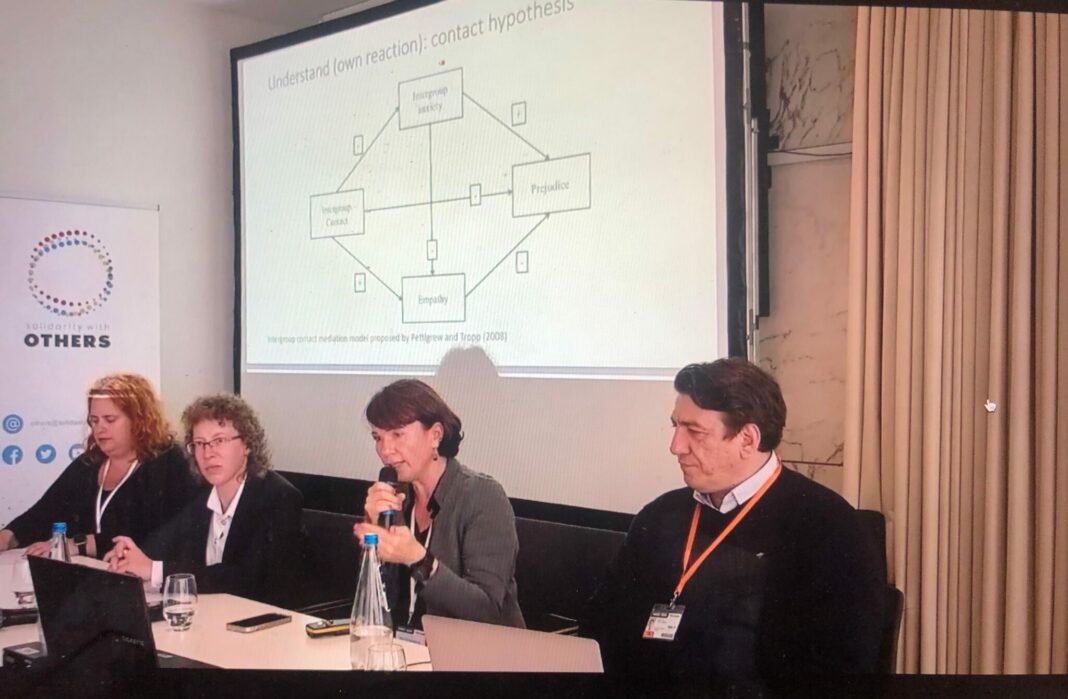Experts at a side event of an Organization for Security and Co-operation in Europe (OSCE) conference in Warsaw on Wednesday called for stronger measures to address hate speech, citing its dangerous role in inciting violence and discrimination, the TR724 news website reported.
Organized by Solidarity with Others, a Belgium-based human rights organization, the panel discussion was part of the two-week Warsaw Human Dimension Conference (WHDC), which aims to address human rights and fundamental freedoms across the OSCE region.
Moderated by Turkish human rights lawyer Coşkun Yorulmaz, the panel included Aneta Szarfenberg from The Maria Grzegorzewska University, Eleni Kardamitsi from Hellenic Youth Participation and Dr. Anna Tatar from the Never Again Association. The event aimed to highlight the risks posed by hate speech and discuss strategies for raising awareness, especially among youth, and protecting minorities.
Yorulmaz, who shared his personal experience with hate speech in Turkey, described an incident from a decade ago involving a school linked to the faith-based Gülen movement.
The Gülen movement, inspired by Muslim cleric Fethullah Gülen, is accused by the Turkish government and President Recep Tayyip Erdoğan of masterminding a failed coup on July 15, 2016 and is labeled a “terrorist organization,” although the movement denies involvement in the coup attempt or any terrorist activity.
Yorulmaz recounted how the Turkish government had deployed two busloads of heavily armed police officers to a Gülen-linked private school in İstanbul, citing a minor planning issue as justification. He noted that the police presence was an attempt to intimidate the Gülen movement. While speaking to the officers, Yorulmaz said he overheard a member of the public encourage the police to use tear gas on the school, which served children aged 3 to 18.
“This is what hate speech leads to at a personal level,” said Yorulmaz. “It allows ordinary people to contemplate violence against children.” He added that hate speech has been used by the Turkish government to legitimize the persecution of the Gülen movement. Yorulmaz cited statistics indicating that nearly 1 million people have been prosecuted and tens of thousands arrested on terrorism charges in Turkey, attributing these actions to a sustained hate campaign that began in 2013.
Examining the roots of hate speech
Szarfenberg, a researcher and Ph.D. student, presented a theoretical framework for understanding hate speech, citing the “hate speech pyramid” model developed by psychologist Gordon Allport. The model describes how hate can escalate from verbal abuse to discrimination, physical violence and even extermination, as seen during the Holocaust. Szarfenberg emphasized that hate speech is not confined to the history books, pointing to recent discriminatory policies in Poland, such as LGBTQ-free zones, which had legitimized prejudice.
She advocated for direct or indirect contact between different social groups as an effective way to break down stereotypes and reduce prejudice. “Social change is possible,” she said, “but it requires action from ordinary people.” Szarfenberg also highlighted the “Living Library” initiative, where participants engage in conversations with individuals from diverse backgrounds, as a tool to foster understanding.
Involving youth in the fight against hate
Eleni Kardamitsi, co-founder of Hellenic Youth Participation and a trainer for the No Hate Speech Movement, focused on the role of youth in combating hate speech. She cited an 18 percent increase in reported hate crimes across EU member states between 2017 and 2020, noting that young people, who make up a significant portion of the population, are crucial to driving cultural change.
Kardamitsi described her organization’s initiatives to support youth-led campaigns and empower young people to take a stand against hate. These included the “Academy of Activists,” which trains young leaders in human rights advocacy, and the “Hate Trackers Into Action” project, which uses digital tools to combat online hate. “Involving young people has brought tangible results,” she said. “By empowering them, we create long-term cultural shifts toward inclusivity and respect.”
Social media platforms under scrutiny
Dr. Anna Tatar, a project manager at the Never Again Association, discussed the challenges of combating hate speech on social media. She presented findings from the “Safe Net” project, which monitors hate content on platforms such as Facebook, Twitter and YouTube. Despite efforts to report hate speech, Tatar said more than 70 percent of flagged content remains online.
“Even when incidents are reported through official channels, platforms fail to enforce their own guidelines,” Tatar said. She pointed out that Facebook removed only 15 percent of reported content, while Twitter removed just 8 percent. YouTube’s removal rate was even lower, at 5 percent. “The existing regulations are not being enforced as they should be,” she added, calling on social media companies to take concrete steps to address the issue.
Broader implications for human rights
The discussion at the OSCE panel discussion highlighted broader concerns about the use of hate speech in political rhetoric, particularly in relation to minority groups. Yorulmaz noted that terms like “FETÖ” — a derogatory label used by the Turkish government to describe the Gülen movement — serve to dehumanize and marginalize its followers, legitimizing state-led persecution.
The panel was part of the WHDC, organized by the Maltese chair and the OSCE Office for Democratic Institutions and Human Rights (ODIHR). Participants included representatives from OSCE member states, civil society organizations, international bodies and human rights institutions.
Call for stronger measures
Panelists urged for stronger international measures to address hate speech, emphasizing that freedom of speech is not an absolute right and should be balanced against the need to protect individuals from harm. As the session concluded, Yorulmaz reiterated the importance of continued advocacy, saying, “We must not allow hate speech to become normalized. It’s our responsibility to push for change.”
The WHDC continues through October 18, providing an opportunity for stakeholders to engage in interactive discussions about human rights across the OSCE region.



